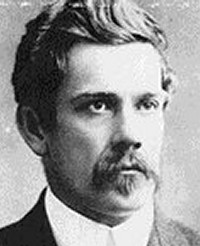John Millington Synge was born in Rathfarnham, Dublin in 1871 into an evangelical Church of Ireland family who previously owned substantial estates in Co. Wicklow. As a young man, Synge's exposure to the works of Darwin and Marx led him to trade (in his words) the "kingdom of heaven" for the "kingdom of Ireland". His Irish patriotism and his study of the Irish language at Trinity College Dublin, however, did not prevent him from moving to France in 1895 to study at the Sorbonne, in the hopes of becoming a critic of French literature. When Synge met W.B. Yeats in Paris in 1896, Yeats – upon hearing that Synge had some Irish – encouraged him to give up his French dream and to go to the Aran Islands and give voice to the people there through works of art. While Yeats took credit for Synge's decision to spend part of each year in the Aran Islands between 1898 and 1901, honing his Irish and collecting folklore and writing about his experiences, Synge was also inspired to pursue such a course by a series of lectures he had attended at the Sorbonne, delivered by the celebrated Celtic scholar, Henri d'Arbois de Jubainville.
While living on the Aran Islands, Synge heard the stories that would later inform the plots of a number of his plays; he also wrote a brilliant memoir about his experiences there, The Aran Islands (1907). While still in Paris, Synge had begun writing his first play, which was about his own Irish gentry background and which was entitled When the Moon Has Set. He completed a first draft in 1901 and presented it to Yeats and Lady Gregory, in the hope that they would produce it as part of their Irish Literary Theatre season. They rejected it, as they would his subsequent reworkings of the script. In fact, Yeats and Gregory only became interested in Synge's drama after he turned to writing "peasant plays". In these later dramas, Synge uses a consciously-heightened literary dialect of Hiberno-English, which was partially inspired by similar dialects used by Douglas Hyde and Lady Gregory. The curious syntax of Synge's literary dialect was based on the speech of those who think in Irish, while speaking in English, and its ornate, poetic qualities can be related to Synge's love of Elizabethan drama. Synge once wrote that "in a good play every speech should be as fully flavoured as a nut or apple"; this is as true of Synge's best work as it is of Shakespeare's.
Synge's early dramas were attacked by narrow-gauge, urban-based Irish Nationalists. These Nationalists wanted to believe in an idealised picture of the rural tenantry – piously Catholic and mild of temper – and therefore considered Synge's work a misrepresentation of Irish country people. Synge responded by saying that, in the considerable amount of time he had spent in the West of Ireland and rural Wicklow, he had witnessed language and behaviour that was much more "vivid" and colourful than anything to be found in his plays; his Nationalist critics were incensed rather than assuaged by such reassurances. When Synge, in his masterpiece – The Playboy of the Western World (1907) – took aim at what he called the "rampant, double-chinned vulgarity" of the new rural middle classes, the outcome was predictable: the play was greeted by riots at the Abbey and when it toured to America. Time has demonstrated that these critics and rioters did not understand what they were condemning. Not only were Synge's plays great works of art; they also critiqued genuine quirks in the Irish "national character" (many, such as a distrust of "law and order", the result of centuries of unjust colonial rule).
Synge died tragically young in 1909 from the Hodgkin's Disease which had plagued him for many years. He was survived by his fiancée, the Abbey actor Molly Allgood.
Plays
- When the Moon Has Set: A New, Two-Act, Composite Version (c.1897-1909) (edited by David Clare)
- In the Shadow of the Glen: Acting Edition (1903) (edited by Shane O'Neill)
- Riders to the Sea (1904)
- The Well of the Saints (1905)
- The Playboy of the Western World (1907)
- The Tinker's Wedding (1908)
- Deirdre of the Sorrows (1910)
Find out more
For more on this playwright from an Irish Studies perspective, see Anthony Roche's book, Synge and the Making of Modern Irish Drama (2013).

